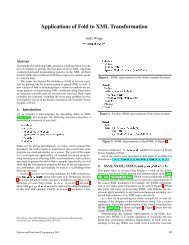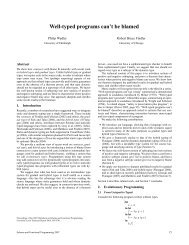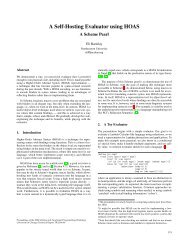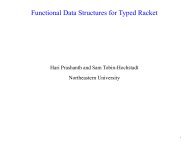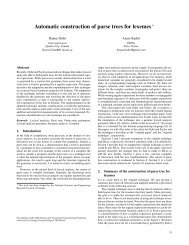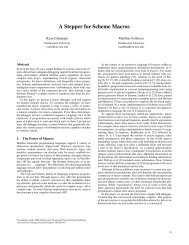2006 Scheme and Functional Programming Papers, University of
2006 Scheme and Functional Programming Papers, University of
2006 Scheme and Functional Programming Papers, University of
Create successful ePaper yourself
Turn your PDF publications into a flip-book with our unique Google optimized e-Paper software.
partition-suml o partitions a set <strong>of</strong> numbers, <strong>and</strong> returns<br />
another set containing the sums <strong>of</strong> the numbers in the<br />
various partitions. (This problem was posed in a July 5, <strong>2006</strong><br />
post on the comp.lang.scheme newsgroup [5]). An example<br />
helps clarify the problem.<br />
(run ∗ (q) (partition-suml o (1 2 5 9) q)) ⇒<br />
((8 9)<br />
(3 5 9)<br />
(17)<br />
(12 5)<br />
(3 14)<br />
(10 2 5)<br />
(1 2 5 9)<br />
(6 2 9)<br />
(1 11 5)<br />
(1 7 9)<br />
(1 2 14)<br />
(15 2)<br />
(6 11)<br />
(10 7)<br />
(1 16))<br />
Consider the value (15 2). We obtain the 15 by adding<br />
1, 5, <strong>and</strong> 9, while the 2 is left unchanged.<br />
We can infer the original set <strong>of</strong> numbers, given a specific<br />
final value.<br />
(run 10 (q) (partition-suml o q (3))) ⇒<br />
((3)<br />
(3 0)<br />
(2 1)<br />
(3 0 0)<br />
(1 2)<br />
(2 0 1)<br />
(3 0 0 0)<br />
(2 1 0)<br />
(0 3)<br />
(1 0 2))<br />
There are infinitely many values containing zero—one way<br />
<strong>of</strong> eliminating these values is to use positive-partition-suml o .<br />
(define positive-pes o<br />
(lambda (in ∗ x out)<br />
(fresh ()<br />
(positive o x)<br />
(cond e<br />
((≡ () in ∗ ) (≡ (x ) out))<br />
((fresh (a d â ˆd)<br />
(≡ (a d) in ∗ )<br />
(cond e<br />
((≡ (â d) out) (plus o x a â))<br />
((≡ (a ˆd) out) (positive-pes o d x ˆd)))))))))<br />
(define positive-partition-suml o ((foldl o positive-pes o ) ()))<br />
(run 4 (q) (positive-partition-suml o q (3))) ⇒<br />
((3)<br />
(2 1)<br />
(1 2)<br />
(1 1 1))<br />
We have eliminated values containing zeros, but we still<br />
are left with duplicate values—worse, the last value is not<br />
even a set. As before, we could use disequality constraints or<br />
other techniques to remove these undesired values. Regardless<br />
<strong>of</strong> whether we use these techniques, the previous run<br />
expression will diverge if we replace run 4 with run 5 ; this<br />
divergence is due to our use <strong>of</strong> foldl o .<br />
3.3 When foldr o <strong>and</strong> foldl o do not work<br />
Consider minusr ∗o , which is a pseudo-variadic minus o defined<br />
using plusr ∗o . Unlike the pseudo-variadic addition relations,<br />
minusr ∗o fails when in ∗ is the empty list. Also, when<br />
in ∗ contains only a single number, that number must be<br />
zero. This is because the negation <strong>of</strong> any positive number is<br />
negative, <strong>and</strong> because Peano numbers only represent nonnegative<br />
integers. These special cases prevent us from defining<br />
minusr ∗o using foldr o or foldl o .<br />
(define minusr ∗o<br />
(lambda (in ∗ out)<br />
(cond e<br />
((≡ (0) in ∗ ) (≡ 0 out))<br />
((fresh (a d res)<br />
(≡ (a d) in ∗ )<br />
(pair o d)<br />
(minus o a res out)<br />
(plusr ∗o d res))))))<br />
Here we use minusr ∗o to generate lists <strong>of</strong> numbers that,<br />
when subtracted from seven, yield three.<br />
(run 14 (q) (minusr ∗o (7 q) 3)) ⇒<br />
((4)<br />
(4 0)<br />
(4 0 0)<br />
(0 4)<br />
(1 3)<br />
(2 2)<br />
(3 1)<br />
(4 0 0 0)<br />
(4 0 0 0 0)<br />
(0 4 0)<br />
(1 3 0)<br />
(2 2 0)<br />
(3 1 0)<br />
(4 0 0 0 0 0))<br />
The values containing zero are not very interesting—let<br />
us filter out those values by using positive-minusr ∗o .<br />
(define positive-minusr ∗o<br />
(lambda (in ∗ out)<br />
(fresh (a d res)<br />
(≡ (a d) in ∗ )<br />
(positive o a)<br />
(minus o a res out)<br />
(positive-plusr ∗o d res))))<br />
Now we can use run ∗ instead <strong>of</strong> run 14 , since there are<br />
only finitely many values.<br />
(run ∗ (q) (positive-minusr ∗o (7 q) 3)) ⇒<br />
((4)<br />
(1 3)<br />
(2 2)<br />
(3 1)<br />
(1 1 2)<br />
(1 2 1)<br />
(2 1 1)<br />
(1 1 1 1))<br />
<strong>Scheme</strong> <strong>and</strong> <strong>Functional</strong> <strong>Programming</strong>, <strong>2006</strong> 111




